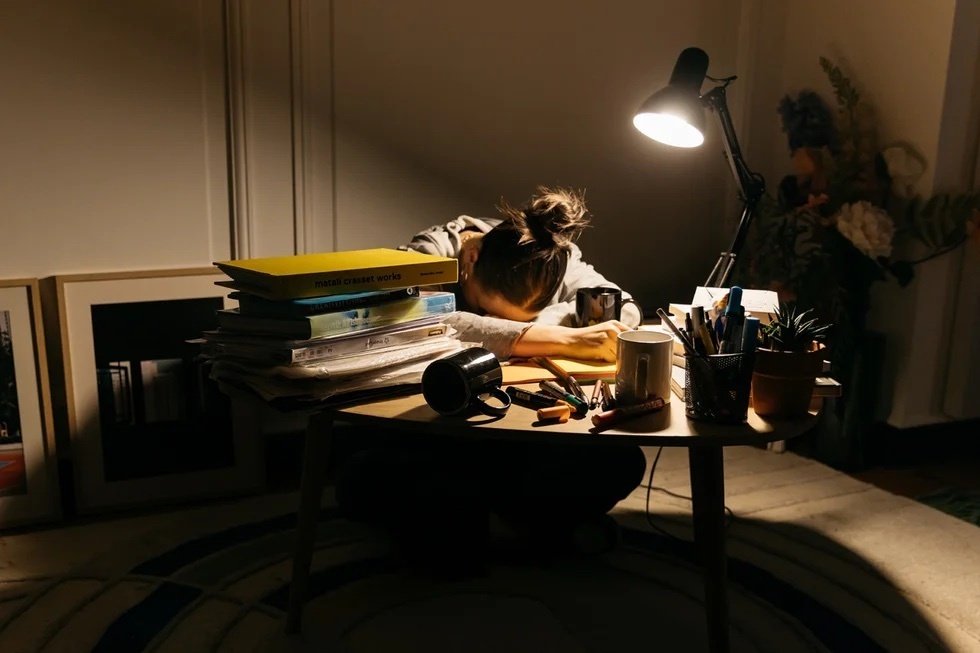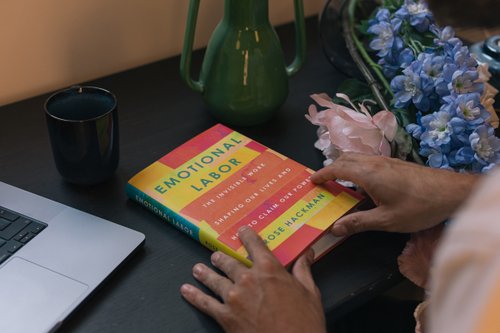New parents at work: The overlooked impact of sleepless nights
Sep 18, 2023
6 mins

JB
Writer, translator and journalist
In the second part of our series on work and sleep, our writer looks at how parenthood can affect sleep patterns, what that can do to your working day and what you can do about it.
Content creator Jonathan Davies had always been used to his daily commute. It was a quick 30-minute drive on the highway to and from the office. However, not long after the birth of his son, this trip turned into a daily opportunity to dice with death. “In the afternoons, on the way home, I would really have to battle to keep my eyes open while driving. That level of tiredness was just dangerous,” he says. Davies was suffering from the effects of sleep deprivation – an issue all too common for new parents.
New parenthood and being sleep deprived goes hand in hand. According to one survey, 70% of parents lose at least three hours of sleep a night in the baby’s first year of life. Though not all parents are so unlucky, a separate study shows that sleep may be disrupted for up to six years. These studies highlight not only how much sleep is lost, but also how prevalent the issue is among new parents.
Dr Whitney Roban, sleep expert and founder of Solve Our Sleep, explains that a healthy baby can start sleeping throughout the night from around four months of age. However, she adds, “those first four months can feel like four years if you’re sleep deprived.” Roban explains that until that age, babies aren’t developmentally ready to sleep through the night and wake up when they need to feed. “There’s no way around it, you’re going to be sleep deprived at the beginning,” she says.
Davies, now a content creator at Daddilife, knows all too well what this feels like. “Sometimes I would be awake for at least an hour trying to get my son back to sleep. Others, I would wake up at 4am and just stay up until it was time to go to work,” he says. Understandably, it wasn’t long before this lack of shut eye started taking its toll on Davies’ emotional wellbeing and productivity.
How a lack of sleep affects parents
“No one is immune from the negative effects of sleep deprivation,” says Roban. “As humans, we need to sleep.” This is because a lack of sleep affects us in three ways: physically, mentally and behaviourally. “Physically, a lack of sleep impacts our immune system and therefore we can become more likely to catch the common cold for example,” Roban says. Likewise, she says that major diseases, such as strokes and heart attacks, all have a negative relationship with sleep.
Then, there is the mental component. “Mental health and sleep are completely intertwined,” she says. This is to say that even a person with no previous history of poor mental health can feel more anxious when they’re running on little sleep. “Sleep regulates your cortisol levels [the stress hormone]. So, if you’re sleep deprived, your cortisol levels will be higher and you will feel more anxious. It’s just science,” she says.
Davies can attest to this as his mental health plummeted during the first year of parenthood. He found himself suffering from postnatal depression: a mood disorder often associated purely with women but which also affects about 8-10% of fathers. When he became a new parent, Davies says he was expecting to feel sleep-deprived, but he was caught off guard by his poor mental health. For Roban, though, this doesn’t come as much of a surprise: “A lot of times, good sleepers, once they become parents, can get into this rut of being up all night with their kids and this can trigger insomnia and/or postpartum depression.”
Finally, there is the behavioral element to sleep deprivation. “Everything you need for being successful at work is affected: your concentration, productivity, efficiency, frustration tolerance, problem-solving skills and social interaction are all impacted by sleep deprivation,” says Roban.
For Davies, the toxic mixture of poor mental health and sleep deprivation meant that his performance at work nosedived. “I didn’t have any creativity at that point. I was just churning stuff out to get it done,” he says. In fact, Davies recalls one instance where he found himself simply staring at his screen unable to process anything. “I had to read – but I had no idea what was on the screen. Absolutely nothing. On several occasions, I nearly called my boss to say, ‘I cannot work. Nothing is going in’,” he adds.
Another person who saw her professional performance affected is Nicole Johnson, lead sleep consultant at The Baby Sleep Site. Around the time of her son’s birth, she was working as a computer programmer. “It was really difficult to keep up,” she says. “I couldn’t think straight during the day. I didn’t feel as productive. I was making mistakes.” In that role as a computer programmer, these mistakes were largely insignificant. However, in some professions, mistakes can be the difference between life and death. She says, “As a sleep consultant, I’ve worked with people who have to be able to focus on what they’re doing such as pilots and surgeons.” In such professions, sleep deprivation can be deadly.
How to work through the early years as parents
Both Roban and Johnson say that there are ways of reducing sleep deprivation and improving family sleep hygiene. For Johnson, this can simply mean “tag-teaming.” This involves parents taking responsibility for the baby on alternate nights so that one parent can get a good night’s sleep while the other parent takes over. However, she recognizes the limitations of this for single parents. She also says that parents should respect the baby’s sleep schedules, adding that parents often try to keep their baby up for as long as possible with the mistaken idea that it will cause the baby to sleep through the night. This usually “backfires” because as we become tired, our bodies release hormones to fight fatigue, which is the same for babies, she says. Therefore, babies start to become overtired and resist sleep.
Roban says that our approach to family sleep has to be consistent and to be set around routine. “You need to be doing the same thing every single night,” she says. She recalls how every night she would put her own child to sleep with an almost ritualistic sequence of turning down the lights, shutting the blinds, singing the same song, etc. “By doing the same thing, the body understands that it needs to relax. It’s a Pavlovian response,” she says.
Johnson adds to this saying that parents often rock their babies in a rocking chair or bounce them on a yoga ball, or even feed them to get them to sleep. However, this means that a baby will “wake up more frequently for you to recreate how they fell asleep.” She says that the aim is to get a baby to learn better sleep associations so that falling asleep “doesn’t involve a parent every single time.”
Why the attitude of parents matters
Roban says that this routine and commitment to good sleep also applies to parents. She points out that some working parents indulge in “revenge bedtime procrastination,” where they stay up late as they feel like they’ve had no time for themselves. However, this often results in less sleep as the parent is soon up an hour later to look after the baby. Likewise, some parents turn to alcohol as a way of helping them drift off to sleep. But, as Roban points out, this is counterproductive as alcohol prevents us from getting quality sleep – and besides, no one wants to be up in the middle of the night tending to a crying baby having drunk with a heavy head.
For Davies, a person who has experienced sleep deprivation at its worst, simply asking for help where you can and communicating can go a long way. He says, “We had a good support network but we were a bit reluctant to ask for help. Even asking a parent or a sibling to have the kid for just an afternoon can help you get rest and recuperate.”
When you’re a new parent, getting a good night’s sleep can feel like nothing more than a fantasy and some even question whether they’ll ever sleep properly again. However, there is light at the end of the tunnel, according to Roban. As quickly as sleep disruption comes, it can go – so long as you understand how to get your child and yourself to sleep. “It’s not a lifetime of unhealthy sleep,” says Roban. But she does emphasize the importance of being committed to good sleep. “Our circadian rhythm [our sleep-wake cycle] is 24 hours. Therefore, everything we do in those 24 hours is important. Eating healthy, getting exercise, self-care, routines… it all counts,” she says. So put away the quick fixes and build up some healthy habits if you want to start sleeping like a baby.
Photo: Welcome to the Jungle
Follow Welcome to the Jungle on Facebook on LinkedIn and on Instagram and subscribe to our newsletter to get our latest articles every day!

More inspiration: Mental health

‘We need each other’: Monika Jiang on combating loneliness in hybrid work
Hybrid work offers flexibility but can leave us feeling disconnected. Monika Jiang explores how we can rebuild workplace connections.
Dec 19, 2024

Struggling at work? Here are 3 steps to rebuilding your self-esteem
Low on confidence? Learn how reflection, recharging, and refocusing can help you rebuild self-esteem and thrive professionally.
Nov 27, 2024

10 ways to beat the Sunday Scaries
Even people who love their jobs can experience the Sunday Scaries. Psychologist Karen Doll offers several strategies to help manage and overcome it.
Sep 12, 2024

Unpacking the burden of emotional labor
Rose Hackman’s "Emotional Labor" reveals how managing emotions impacts everyone, especially women and minorities.
Aug 08, 2024

Is financial anxiety harming your productivity?
Feeling overwhelmed by financial anxiety? You're not alone. Discover practical steps and expert advice to regain control of your work-life balance.
Jul 31, 2024
The newsletter that does the job
Want to keep up with the latest articles? Twice a week you can receive stories, jobs, and tips in your inbox.

Looking for your next job?
Over 200,000 people have found a job with Welcome to the Jungle.
Explore jobs